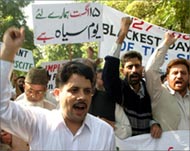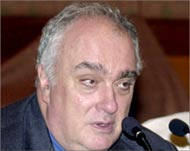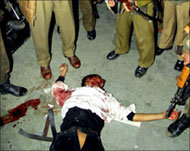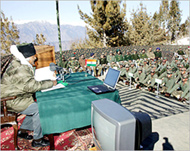Suspected separatists killed in Kashmir
Indian paramilitary soldiers have shot dead three suspected separatist fighters in the town of Sopore, 48km northwest of Srinagar, the summer capital of Indian-administered Kashmir.

And in a separate incident on Wednesday, five suspected infiltrators were killed by Indian border guards in Kathua district, close to the border with Pakistan.
Referring to the Sopore deaths, K Srinivasan, deputy inspector-general of India’s Border Security Force (BSF), said three motorcycle-borne separatist fighters were killed by security personnel in the Hathishah locality.
“The pillion riders held assault rifles while the bike rider hurled a grenade in the direction of our boys manning a makeshift post in the area,” Srinivasan said.
After one BSF soldier was “slightly injured” in the attack, his colleagues quickly retaliated by opening fire that killed all the three fighters.
‘Hit-and-run mission’
Local police officers confirmed the killing of three men who they said were apparently on a “hit-and-run” mission.
 |
|
Many of the separatist groups |
Their identity is still being ascertained, one police officer said.
“While we have no doubt that two of the men were militants, we are investigating whether the third man in the driver’s seat was an accomplice or had been forced to carry the militants to the area,” he said.
A local source said the corpses of the men were lying on a road close to the BSF post, and police and paramilitary officials were waiting for a bomb-disposal squad to arrive.
Bomb-disposal experts usually inspect the bodies of slain fighters for explosives before moving them to police mortuaries.
Suspicious movements
As for Wednesday’s second deadly incident, the five people who were killed by Indian border guards were suspected to be separatist fighters who had sneaked into the Indian side of the de facto border that splits Kashmir region between Indian and Pakistani administered parts.
|
“The group was asked to stop in their tracks. However, they began running from the spot, forcing the troops to open fire in which all the five men were killed” Indian army spokesperson |
The incident occurred in Kathua district’s Hiranagar sector at 2.40am local time when Indian border guards deployed at a nearby army post noticed suspicious movements.
“The men were asked to stop in their tracks. However, they began running from the spot, forcing our troops to open fire in which all the five members of the group were killed,” an army spokesperson said in Jammu, the winter capital of the state.
Police sources in Jammu, however, said it has not been confirmed as yet whether the slain men were separatist fighters crossing over from Pakistan or Bangladeshi nationals who often use the porous border to move between the two countries in search of jobs.
Pugwash conference
The Indian security forces’ success formed the backdrop to the last day of a meeting in the Nepalese capital, Kathmandu, attended by political leaders, intellectuals and former government functionaries from both parts of divided Kashmir, aimed at ending the violence in the region.
 |
|
Cotta-Ramusino of Pugwash said |
The participants hoped that a sustained dialogue between India and Pakistan would lead to a resolution of all outstanding issues, including the Kashmir problem.
A consensus statement, issued on the conclusion of the three-day conference held as a part of so-called Track II diplomacy, said the peace process should be carried forward to seek an “honourable and feasible solution” to the Kashmir problem.
It also acknowledged that the “dignity and welfare of inhabitants of Jammu and Kashmir should be of paramount importance”.
The meet was sponsored by a Rome-based non-governmental organisation, Pugwash Conferences on Science and World Affairs. Its secretary-general, Paolo Cotta-Ramusino, said, “The participants were unanimous that violence is a serious problem and not a means to achieve solution.”
Further pullout
Meanwhile, back in the valley, a further 1000 Indian troops have been “de-inducted”, raising the number of the soldiers pulled out of Indian-administered Kashmir over the last one month to 7000.
“The latest batch of the troops de-inducted were deployed in north of the Valley,” Lt-Col VK Batra, a spokesperson for the Indian army in Srinagar, said on Wednesday.
 |
|
Eight alleged separatist fighters |
Senior Indian army commanders at the Rangreth airbase saw off the troops.
The phased pullout began on 16 November during a visit to Srinagar by Indian Prime Minister Manmohan Singh as part of a proposal to reduce the number of Indian security forces engaged in combating a 16-year-old separatist rebelllion in predominantly Muslim Kashmir.
On Wednesday, the “de-inducted” troops, dressed in khaki and sporting green berets, left in a convoy of trucks and buses bound for an unknown destination in India.
“They will be relocated outside Jammu and Kashmir,” commander of army’s 16 Corps, Lt-Gen Nirbhay Sharma said.
‘Cosmetic’ move
One of the departing 16 Corps soldiers said, “We’ve happily served in Kashmir for quite some time. People have been very friendly to us and we will miss them.”
Lt-Gen Sharma refused to divulge the total number of troops the Indian government plans to withdraw from the state.
 |
|
India has undertaken a limited |
The de-induction, he said, was taking place keeping in view operational requirements.
He added that the 12ft high fence erected along the Line of Control has been very helpful in thwarting cross-border activities such as infiltration and ex-filtration by separatist fighters.
Pakistan has termed the pullout “cosmetic” and asked for a substantial withdrawal to enable “improvement in the human -rights situation” in Kashmir.
President General Pervez Musharraf told a visiting Indian journalists’ delegation in Lahore recently that it was good that India had pulled out some troops from Kashmir.
“But it to me seems only a technical move and not strategic. The forces can comeback. It is not a step towards resolving Kashmir problem as such but only cosmetic,” he said.